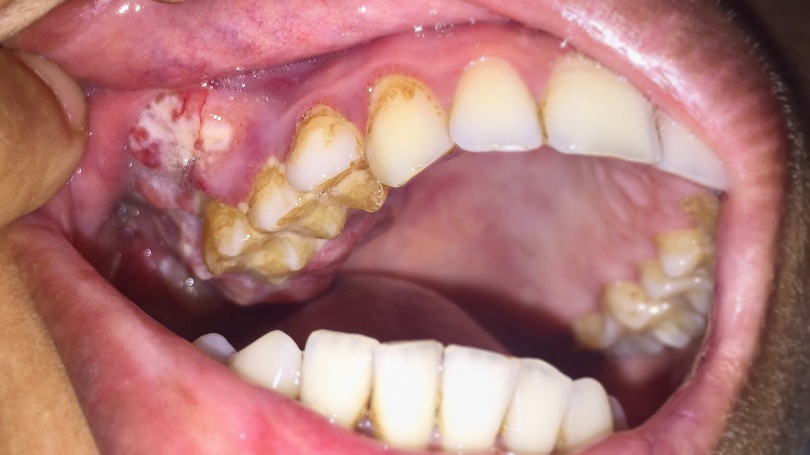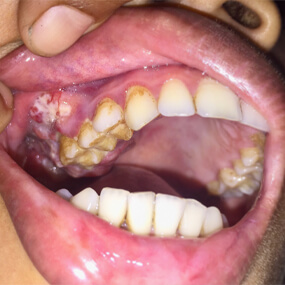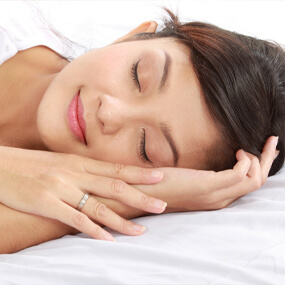Oral Cancer: What Are the Signs and Are You at Risk?

Oral cancer is prevalent and accounts for about 5 percent of all cancer incidents. More than 50,000 Americans are diagnosed with oropharyngeal cancer annually, according to data from the American Cancer Society. In addition, more than 11,000 people die from the disease on an annual basis.
Even more concerning is that the incident rates of mouth and throat cancer are on the rise, and the reason is unclear. The human papillomavirus, a sexually transmitted infection, is one cause but does not account for the total increase. This problem is compounded by the fact that oral cancer often goes undiagnosed during its earliest stages. Dentists are crucial in this regard because a large portion of the population can get screened during the biannual visits recommend by the American Dental Association.
What Is Oral Cancer?
Oral cancer—also known as mouth cancer or oropharyngeal cancer—is a group of cancers that scientists organize into two broad categories. One category involves cancers in the oral cavity, such as the lips, cheeks, teeth, gums, roof, and floor of the mouth and the front section of the tongue. The other category involves cancers in the oropharynx, including the throat, tonsils, and back of the tongue.
What Are the Indications of Oral Cancer?
Be mindful that oral cancer often does not manifest obvious symptoms in the early stages, which is why regular screening is so important. However, you should schedule a visit with your dentist immediately if you have any of the following symptoms and they have persisted for more than two weeks:
- Ear pain
- Sore throat
- Hoarseness or changes to the voice
- Odd sensations in the back of the throat
- Changes to your bite
- Unexplained bleeding in the mouth
- Lumps, bumps, or rough spots in or around the mouth
- Restricted or painful movement of the jaw or tongue
- Difficulties chewing, swallowing, or speaking
- Persistent sores in the mouth but also on the face or neck
- Unexplained numbness or pain in the face, mouth, or neck
- Patches in the mouth that are white or red
Who Is Most at Risk of Oral Cancer?
Science has identified a number of risk factors that make people much more prone to oral cancer. According to the American Cancer Society, these risk factors include:
Tobacco
Tobacco products are a leading cause of cancer in general, and oral cancer is no exception. In fact, medicine deems tobacco to be the highest risk factor, and it is estimated that about 85 percent of all head and neck cancer incidents are tobacco-related. With oral cancer, the concern is not just smoking cigarettes, cigars, and pipes but chewing tobacco, dip, snuff, and so forth. Consider that lip cancer incident rates are high among pipe smokers, and people who regularly put some form of chewing tobacco in their mouths increase their risk of cancer by 50 percent. It is also important to note that secondhand smoke substantially increases the risk of oral cancer as well.
Marijuana
There is a prevalent perception that marijuana is safer than tobacco, but this may not be the case when it comes to oral cancer. Recent research indicates marijuana users are at a higher risk than normal.
Alcohol
According to American Cancer Society data, 70 percent of all patients with oral cancer are heavy drinkers. Consider that according to the Centers for Disease Control and Prevention, heavy drinking is averaging more than two drinks a day if you are male and more than one drink a day if you are female. The risk of oral cancer increases significantly when a person is both a smoker and a heavy drinker.
Human Papillomavirus (HPV)
HPV encompasses more than 100 varieties of a viral infection that is spread from skin to skin and often sexually transmitted. Research has demonstrated that HPV is a serious risk factor for oral cancer, and the statistics reveal that HPV-related oral cancer incidents are on the rise. The most common way to get HPV is to be sexually active with a person who has HPV. There are various strains of HPV, and research is revealing that certain strains are a greater risk factor for oral cancer than others.
There are ways to protect yourself. There are vaccines available for HPV. You can also reduce your risk by limiting your number of sexual partners and avoiding casual sex with strangers, and you should be aware that condoms do not provide guaranteed protection from HPV. Research indicates cancer rates are lower among vaccinated people who are exposed to HPV later. The CDC advises vaccination for adolescents at about age 12. Catch-up HPV vaccinations are advised through age 26. The benefits of vaccinating in the late 20s and beyond are unknown, so you should discuss this with your doctor.
Gender
Men are twice more prone to oral cancer than women. The American Cancer Society recognizes that this may be due to alcohol and tobacco usage rates being higher among men. However, younger males are more prone to HPV-related oral cancers than females in the same age group.
Age
Oral cancer incidents are most common in people age 55 and up. The exception is HPV-related oral cancer, which is far more common in people in their early 20s than older people.
Sun Exposure and Fair Skin
Exposure to the sun without protection as well as prolonged exposure even with protection is a significant risk factor for lip cancer. Reduce your risk by limiting your exposure to sunlight as well as other ultraviolet radiation sources, such as tanning beds. When you are exposed, consider wearing a hat that shades your face as well as using a sunscreen that contains zinc oxide or titanium dioxide. People with fair skin are at greater risk and so need to take even greater care in this regard.
Poor Oral Hygiene
There is increasing scientific evidence that people with poor oral care habits may be at greater risk of oral cancer. Evidence shows that chronic infections and inflammation make a person more prone to cancer. In addition, smokers often experience poor oral health, heavy drinkers often practice poor oral hygiene, and people with bad oral care habits often do not see their dentists on a regular basis.
Poor Nutrition
Nutritional deficiencies make you prone to poor oral health and may contribute to oral cancer. In addition, a person with a poor diet is more inclined to exacerbate the problem with sugary and processed foods. Hydration, vegetables, and dairy products are essential to good oral health.
Immunodeficiency
When your immune system is compromised, you are more prone to oropharyngeal cancer as well as many other diseases. During this period of having a weakened immune system, it is crucial that a person be even more vigilant when it comes to diet, oral hygiene, screening, and so forth.
Oral Cancer Screening
Dentists are the first line of defense when it comes to oral cancer, and you should ensure that you see your dentist twice a year and that he or she performs oral cancer screening as part of a general exam. Your dentist will evaluate you for precancerous and cancerous conditions, and when oral cancer is diagnosed in the early stages, the chances of curing the disease rise considerably.
During your exam, your dentist will review and update your medical history. He or she will also ask you about any new or unusual experiences related to your mouth, neck, and head. This is your opportunity to tell your dentist about any potential symptom that has perhaps made you uneasy. Your dentist will then perform a visual and physical examination and may use certain tools, such as a light wand. If anything is out of the ordinary, your dentist will explain what it is and advise a biopsy.
Get Screened for Oral Cancer
Oral cancer screening saves lives because survival rates are high when the disease is detected early. Your dentist can be invaluable in this regard, but not all dentists screen for oral cancer. At Scottsdale Cosmetic Dentistry Excellence, we are committed to the health of our patients, and that includes oral cancer screening as part of every exam we perform at no additional cost to you. Jeffrey D. Clark, DDS, is a leading dentist in the Scottsdale area with more than 20 years of experience. His ongoing education includes staying current on oral cancer risk factors, and he regularly engages in interprofessional collaboration regarding the early diagnosis of oropharyngeal cancer and other serious diseases.
All of the dental hygienists at Scottsdale Cosmetic Dentistry Excellence are trained to identify unusual lesions and alert Dr. Clark immediately. During your exam, Dr. Clark will perform a visual and physical inspection of your oral cavity in order to detect cancerous and precancerous conditions. Dr. Clark will feel and look at your jaw, chin, neck, head, and so forth for discoloration, bumps, lumps, asymmetries, ulcers, and so on. He will also use a light that excites oral tissues, which can help to detect changes not visible to the naked eye. If any abnormality is found, Dr. Clark will immediately refer you to a specialist for a biopsy. Oral cancer screening is painless and fast, and we will include it as part of your regular checkup. It could save your life. Call us today at 480 585 1853 to schedule your appointment.




